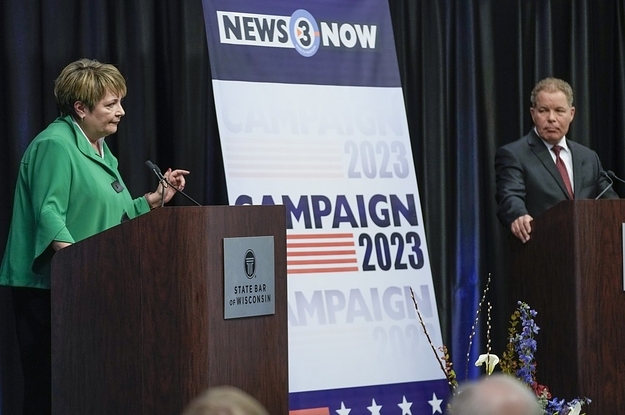The upcoming election for a seat on the Wisconsin Supreme Court is being hailed as the most significant election of the year for abortion rights. Although the state Supreme Court is officially nonpartisan, the outcome of this race will determine the ideological balance of its judges and directly impact the future of abortion rights in Wisconsin. The court is expected to rule on whether an 1849 law banning abortion should remain in effect. This is a crucial issue as the US Supreme Court overturned Roe v. Wade last year and the responsibility for interpreting abortion laws now falls on the 50 state supreme courts.
Reproductive rights have become a major focus in state elections since the landmark Roe v. Wade ruling was overturned. In Kansas, voters rejected an attempt to remove abortion protections from the state constitution. During last year’s midterm elections, several states, including Michigan and Kentucky, saw voters defend reproductive rights at the ballot box. In Wisconsin, the overturning of Roe v. Wade resulted in the reactivation of the 1849 ban on abortion, which allows the procedure only to save the pregnant person’s life. Democratic Attorney General Josh Kaul and Governor Tony Evers filed a lawsuit to challenge the ban and pledged not to enforce it while the legal battle continues. However, the ambiguity surrounding the ban’s legality has caused many abortion providers in the state to stop offering the procedure.
Kaul and Evers won re-election in November after campaigning on their support for abortion rights. The case is now expected to be heard by the state Supreme Court in the next year or two, and the justices will have the final say on whether the 1849 ban should remain in effect. Consequently, the election has garnered significant attention and has become one of the most closely watched contests in the country. Former President Barack Obama has urged Wisconsinites to vote, and the election has already broken spending records as the most expensive state Supreme Court election in US history. Approximately $29 million has been spent on political ads for this race, according to the Brennan Center for Justice.
The outcome of this election will have far-reaching consequences for abortion rights in Wisconsin. If the conservative candidate wins, it could solidify the court’s conservative majority and increase the likelihood of upholding the 1849 ban on abortion. This would severely restrict access to abortion in the state and set a precedent for other conservative-leaning states to follow suit. Conversely, if the liberal candidate wins, it could shift the balance of the court and potentially lead to the overturning of the ban, thereby protecting and expanding abortion rights in Wisconsin.
The significance of this election extends beyond Wisconsin. With the US Supreme Court becoming increasingly conservative, the fate of abortion rights now lies in the hands of state supreme courts. The outcome in Wisconsin could influence similar cases in other states and potentially shape the future of abortion rights nationwide. As such, activists on both sides of the abortion debate are closely watching this election and investing significant resources to support their preferred candidate. Ultimately, the election will determine the direction of abortion rights in Wisconsin and could have broader implications for reproductive rights in the United States.









